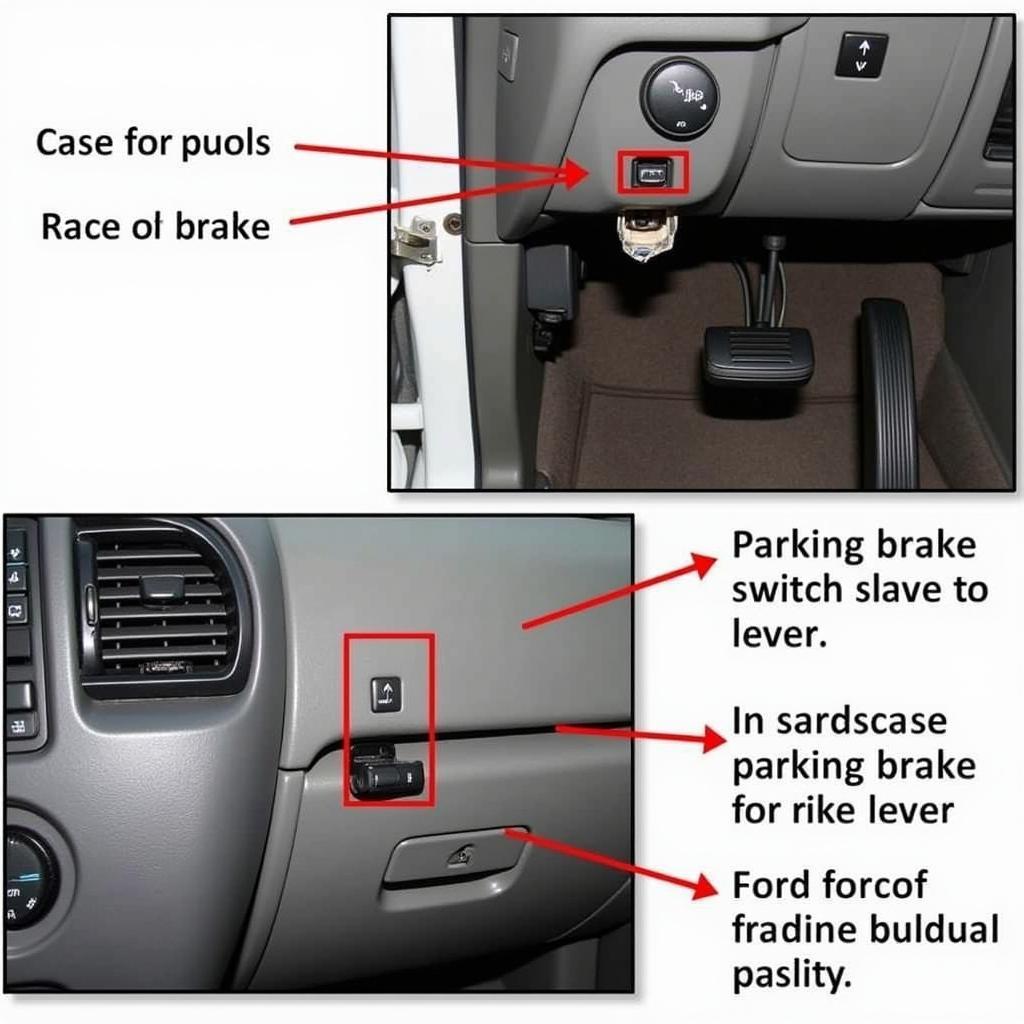The parking brake warning light on your 2000 Ford F53 is an essential safety feature. When illuminated, it signals a potential issue with your parking brake system, which could range from a simple disengagement to a more serious electrical fault. This comprehensive guide will delve into the common causes of a lit parking brake warning light on a 2000 Ford F53, focusing specifically on the circuit, and provide you with the knowledge to diagnose and potentially fix the problem yourself.
Understanding the Parking Brake Warning Light System
Before we dive into troubleshooting, it’s crucial to grasp how the parking brake warning light system operates. In your 2000 Ford F53, the system comprises several key components:
- Parking Brake Lever: When engaged, the lever activates a switch.
- Parking Brake Switch: This switch acts as a signal sender, alerting the vehicle’s electrical system when the parking brake is engaged.
- Instrument Cluster: The warning light on your dashboard is part of the instrument cluster, receiving signals from the parking brake switch.
- Wiring and Connectors: These elements connect the various components, ensuring signal transmission.
The system works on a simple principle: when the parking brake is engaged, the switch closes the circuit, sending a signal to illuminate the warning light. Conversely, disengaging the parking brake opens the circuit, turning off the light.
Common Causes of a Lit Parking Brake Warning Light
A persistent parking brake warning light, even when the brake is disengaged, indicates a fault within the system. Several culprits could be responsible:
1. Faulty Parking Brake Switch
A malfunctioning parking brake switch is a common culprit. Over time, the switch can wear out, become misaligned, or suffer internal damage, leading to a continuous signal to the warning light.
2. Wiring Issues
The wiring connecting the parking brake switch to the instrument cluster can be susceptible to damage, corrosion, or loose connections. A break in the circuit or poor contact can result in a constant or intermittent warning light.
3. Low Brake Fluid
While not directly related to the circuit, low brake fluid levels can trigger the parking brake warning light. Your 2000 Ford F53 utilizes a shared reservoir for the hydraulic brake system and the parking brake. If the fluid level drops significantly, it can trigger the warning light as a safety precaution.
4. Instrument Cluster Malfunction
Although less common, a faulty instrument cluster can cause a range of warning light issues, including a false parking brake warning light.
Diagnosing the Problem: 2000 Ford F53 Parking Brake Warning Light Circuit
Before proceeding with any repairs, it’s crucial to diagnose the root cause of the illuminated warning light. Here’s a step-by-step approach:
-
Check the Parking Brake Lever: Ensure the parking brake lever is fully disengaged. Sometimes, a slight engagement can trigger the light.
-
Inspect the Brake Fluid: Locate the brake fluid reservoir in the engine bay and visually check the fluid level. If it’s below the minimum mark, add the appropriate brake fluid to the reservoir.
-
Inspect the Parking Brake Switch: Locate the parking brake switch, usually positioned near the base of the parking brake lever under the dashboard. Visually inspect the switch and its connecting wiring for any signs of damage, corrosion, or loose connections.
 Locating the Parking Brake Switch in a 2000 Ford F53
Locating the Parking Brake Switch in a 2000 Ford F53
-
Test the Parking Brake Switch: With the parking brake disengaged, disconnect the electrical connector from the switch. Using a multimeter, test for continuity across the switch terminals. Continuity with the brake disengaged indicates a faulty switch that needs replacement.
-
Inspect the Wiring Harness: Trace the wiring harness from the parking brake switch towards the instrument cluster, looking for any signs of chafing, pinching, or damage. Repair or replace any damaged sections of the wiring harness.
Seeking Professional Assistance
If you’re uncomfortable performing these diagnostic steps or if the issue persists despite your efforts, it’s advisable to seek assistance from a qualified mechanic or a specialized automotive electrician. They possess the expertise and tools to accurately diagnose and repair any electrical issues with your 2000 Ford F53’s parking brake system.
Conclusion
Understanding the intricacies of your 2000 Ford F53’s parking brake warning light circuit empowers you to address this common issue. By following these diagnostic steps and taking necessary precautions, you can ensure the proper functioning of your parking brake system and maintain the safety of your vehicle. Remember, if in doubt, always consult a professional for expert assistance.

